Related Research Articles

The University of Oregon is a public research university in Eugene,Oregon. Founded in 1876,the university also has two Portland locations,and manages a marine station,called the Oregon Institute of Marine Biology,in Charleston;and an observatory,called Pine Mountain Observatory,in Central Oregon.

Philip Hampson Knight is an American billionaire business magnate who is the co-founder and chairman emeritus of Nike,Inc.,a global sports equipment and apparel company. He was previously its chairman and CEO. As of December 2023,Forbes estimated his net worth at $45.0 billion. He is also the owner of the stop motion film production company Laika. Knight is a graduate of the University of Oregon and the Stanford Graduate School of Business. He was part of the track and field club under coach Bill Bowerman at the University of Oregon with whom he would later co-found Nike.

The Oregon Ducks are the intercollegiate athletic teams that represent the University of Oregon,located in Eugene. The Ducks compete at the National Collegiate Athletic Association (NCAA) Division I level as a member of the Pac-12 Conference. With eighteen varsity teams,Oregon is best known for its American football team and track and field program,which has helped Eugene gain a reputation as "Track Town,USA". Oregon's main rivalries are with the Oregon State Beavers and the Washington Huskies.
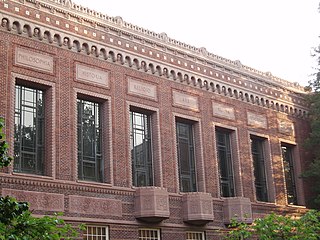
Knight Library is the main facility of the University of Oregon's (UO) library system. It is located on the university's campus in Eugene,Oregon,United States. The library design is emblematic of the architecture of the university's older buildings,and it serves as a hub of student activity. As of 2008 it has a collection of more than 3 million volumes. The library also holds collections of primary sources such as photographs and manuscripts on various topics at the Special Collections &University Archives. It is also a depository for the Federal Depository Library Program. The library was previously known as the Main Library and it was renamed the Knight Library in 1988,in honor of the family of Phil Knight.
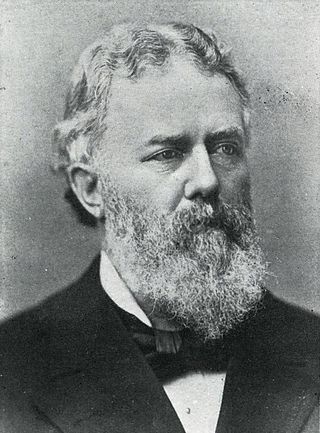
Matthew Paul Deady was a politician and jurist in the Oregon Territory and the state of Oregon of the United States. He served on the Oregon Supreme Court from 1853 to 1859,at which time he was appointed to the newly created federal court of the state. He served as a United States district judge of the United States District Court for the District of Oregon in Portland,as the sole Judge until his death in 1893. While on the court he presided over the trial that led to the United States Supreme Court decision of Pennoyer v. Neff concerning personal jurisdiction.
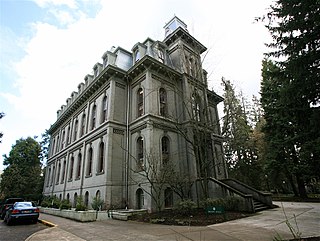
University Hall,formerly Deady Hall,is a historic building located in Eugene,Oregon,United States. It was built from 1873 to 1876 by W. H. Abrams to a design by architect William W. Piper. It was the University of Oregon's first building,and remained the university's only building for almost ten years after its construction. After the university gained other buildings,it was known simply as the "Old Building",but in 1893 it was renamed "Deady Hall" in honor of Matthew Deady,Oregon's first federal judge. Ironically,Deady believed that state universities were of little use to anybody,and in 1857,during the Oregon Constitutional Convention,Deady moved to strike the section authorizing a university from the Oregon State Constitution. His efforts were initially successful,although by the 1870s a state university had become inevitable,and the building that bears his name was constructed in spite of Deady's earlier objections. In another twist of fate,Deady was first president of the university's Board of Regents.

The campus of the University of Oregon is located in Eugene,Oregon and includes some 80 buildings and facilities,including athletics facilities such as Hayward Field,which was the site of the 2008 Olympic Track and Field Trials,and McArthur Court,and off-campus sites such as nearby Autzen Stadium and the Riverfront Research Park. An online guide to the university's built environment,Architecture of the University of Oregon,published by the University of Oregon Libraries,describes campus buildings and provides timelines of key architectural events linked with campus history.

The University of Oregon College of Design is a public college of architecture and visual arts in the U.S. state of Oregon. Founded in 1914 by Ellis F. Lawrence,the college is located on the University of Oregon campus in Eugene,off the corner of 13th and University streets,and also has programs at the historic White Stag Block in Portland,Oregon.
The University of Oregon has a diverse array of student-run and non-student-run media outlets.

The Global Scholars Hall (GSH) is a building on the University of Oregon campus in Eugene,Oregon. Opened in Fall 2012,the 185,000 square foot building serves as an undergraduate residence hall,dining facility,library,classroom,and performing arts complex. The construction of GSH was funded mostly by state bonds and student housing fees.
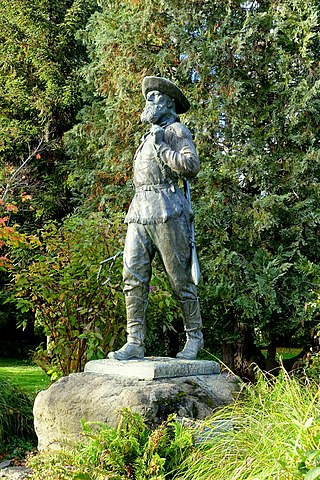
The Pioneer is a thirteen-foot-tall bronze sculpture formerly located on the University of Oregon campus in Eugene,Oregon,United States. It was the artistic work of Alexander Phimister Proctor,commissioned by Joseph Nathan Teal,a Portland attorney. A ceremony celebrated its unveiling on May 22,1919. It included attendance from persons all across the state,the majority of enrolled students,and a special section of the crowd was reserved for the remaining settlers. T. G. Hendricks and his granddaughter removed the canvas cover,unveiling the statue. As of June 13,2020,the statue is no longer standing on the University of Oregon campus.

The Pioneer Mother is a sculpture formerly located on the University of Oregon campus in Eugene,Oregon. Burt Barker donated the six-foot-tall bronze sculpture,created by artist Alexander Phimister Proctor,to the university. Barker's daughter,Barbara Barker,introduced the sculpture to a public gathering of hundreds on May 7,1932,during Junior Week and Mother's Day festivities.
William Beaty Boyd was an American academic administrator and professor. Boyd was an alumnus of Presbyterian College,Emory University,and the University of Pennsylvania. He was a professor of history at Michigan State University and Alma College. He was also Vice Chancellor of Student Affairs at the University of California,Berkeley.

The Charles H. Lundquist College of Business is the University of Oregon's business school. Founded in 1914,the Lundquist College offers undergraduate degree programs in business administration and accounting,as well as MBA,Executive MBA,Master of Science in Sports Product Management,Master of Accounting,Master of Science in Finance,and PhD graduate programs. These degree programs are supported by four departments and one school of accounting.

Collier House is a historic landmark building located in Eugene,Oregon,United States. It was built in 1886 by George Collier,a physics and chemistry professor at the University of Oregon,and his two sons to his own design. It was originally built as his residence but was sold to the university in 1893,when it joined University and Villard halls as the third building on the fledgling campus. It lies on the corner of University Street and 13th Avenue.
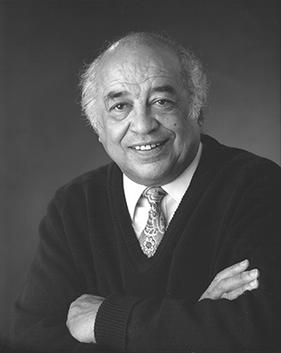
DeNorval Unthank Jr. was an American architect. In 1951 he was the first black man to earn an architecture degree from the University of Oregon (UO). Unthank worked on the courthouse in Lane County,Oregon;McKenzie Hall;and Kennedy Junior Middle School in Eugene,Oregon. He is the eponym of Unthank Hall at UO.
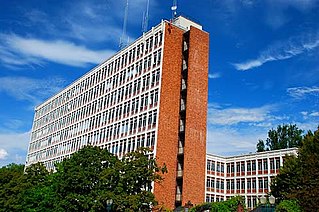
Prince Lucien Campbell Hall (PLC) is a high rise building on the University of Oregon (UO) campus in Eugene,Oregon,USA. Named for Prince Lucien Campbell,the fourth president of the university,PLC houses classrooms,staff offices,and an auditorium.
Lyllye Reynolds-Parker is an American civil rights activist and educator. Born into one of the founding Black families of Eugene,Oregon,she is a leader in the city's movement for racial justice. She worked as a counselor at the University of Oregon’s Multicultural Center. The University honored her by opening the Lyllye Reynolds-Parker Black Cultural Center in 2019.
Ties between Nike,Inc. and the University of Oregon are ongoing and have existed for decades. The relationship is so close that the institution is sometimes referred to as the "University of Nike".
References
- ↑ "Michael H. Schill named next president of Northwestern". news.northwestern.edu. Retrieved 2022-08-11.
- ↑ "MICHAEL H. SCHILL – President-elect – Northwestern University" (PDF). Northwestern University. Retrieved 2023-03-07.
- 1 2 3 4 5 "Michael Schill faculty page, University of Chicago Law School" Archived 2013-01-05 at the Wayback Machine
- ↑ "Michael H. Schill | University of Chicago Law School". www.law.uchicago.edu. Retrieved 2022-08-17.
- ↑ Schill, Michael Harry (1980). Reinvestment and Displacement: A Research Strategy (Thesis).
- ↑ Theen, Andrew (2016-07-01). "1 year in, Michael Schill brings quiet swagger and academic chops to UO". oregonlive.com. Retrieved 2019-08-13.
- ↑ "Michael Schill of the University of Chicago to be new UO president | Around the O". around.uoregon.edu. 14 April 2015. Retrieved 2016-02-14.
- ↑ "The Investiture of Michael H. Schill". President. 2016-04-01. Retrieved 2019-08-13.
- ↑ "Priorities and Initiatives". President. 2015-06-15. Retrieved 2019-08-13.
- ↑ "Open Mike: student success and other 2018 priorities". President. 2018-01-12. Retrieved 2019-08-13.
- ↑ "This changes everything: President announces historic Knight gift". Around the O. 2016-10-17. Retrieved 2019-08-13.
- ↑ "University of Oregon Erecting a $1-Billion Science Center". The Scientist Magazine®. Retrieved 2019-08-13.
- ↑ Glucklich, Elon. "University of Oregon expands its Knight research campus footprint with $3.7 million purchase". The Register-Guard. Retrieved 2019-08-13.
- ↑ "University closes deal on critical Knight Campus property". Around the O. 2017-06-01. Retrieved 2019-08-13.
- ↑ Theen, Andrew (2016-10-18). "Phil and Penny Knight will give $500 million to University of Oregon for science complex". oregonlive.com. Retrieved 2019-08-13.
- ↑ Griffin, Anna. "University Of Oregon Gets $500 Million Gift From Phil And Penny Knight". www.opb.org. Retrieved 2019-08-13.
- ↑ McGraw, Noah. "UO receives $500 million donation from Knight family for three-building research campus". Daily Emerald. Retrieved 2019-08-13.
- ↑ "Science Advancing Society: Knight Campus Grand Opening | Knight Campus". accelerate.uoregon.edu. Retrieved 2021-02-23.
- ↑ "University of Oregon Receives Second $500 Million Gift for the Phil and Penny Knight Campus for Accelerating Scientific Impact". accelerate.uoregon.edu. Retrieved 2021-09-21.
- ↑ Nietzel, Michael T. "Phil And Penny Knight Have Just Given A Second $500 Million Gift To The University Of Oregon". Forbes. Retrieved 2021-09-21.
- ↑ Brown, Jordyn. "UO receives second $500 million gift for Phil and Penny Knight Campus for science". The Register-Guard. Retrieved 2021-09-21.
- ↑ Theen, Andrew (2018-02-17). "Is Oregon great? Science projects aim to put the state's universities on the map". oregonlive.com. Retrieved 2019-08-13.
- ↑ "UO, OHSU Join Forces to Combat Cancer with Data Science". Around the O. 2019-03-12. Retrieved 2019-08-13.
- ↑ "UO and OHSU partner to fight cancer with data". Daily Emerald. Retrieved 2019-08-13.
- ↑ "Ducks Fly Past $3B Campaign Goal". Around the O. 2021-09-13. Retrieved 2021-09-21.
- ↑ Darling, Dylan. "UO aims for another billion dollars in fundraising". The Register-Guard. Retrieved 2019-08-13.
- ↑ "$1 billion for students, academics added to UO fundraising goal". Around the O. 2018-09-26. Retrieved 2019-08-13.
- ↑ President Schill unveils the "Oregon Commitment" , retrieved 2019-08-13
- ↑ Eller, Caley. "President Schill reveals the "Oregon Commitment" at first all-campus address". Daily Emerald. Retrieved 2019-08-13.
- ↑ ""What Makes Human Beings Human." A Higher Ed Fundraising Boom is Boosting the Liberal Arts". Inside Philanthropy. Retrieved 2019-08-13.
- ↑ Tobin, Michael. "University of Oregon sees 8 percent student growth, largest Pathway Oregon class". Daily Emerald. Retrieved 2019-08-13.
- ↑ "President's Fall Welcome | Office of the President". president.uoregon.edu. Retrieved 2021-02-23.
- ↑ "Five Year Report | Office of the President". president.uoregon.edu. Retrieved 2021-02-23.
- ↑ Crowley, Casey. "New UO building Tykeson Hall will be the home of the College of Arts and Sciences starting fall 2019". Daily Emerald. Retrieved 2019-08-13.
- ↑ Kanik, Hannah. "Department of Undergraduate Studies uses technology for student success". Daily Emerald. Retrieved 2019-08-13.
- ↑ "The UO's four- and six-year graduation rates reach new high". Around the O. 2019-11-20. Retrieved 2021-02-23.
- ↑ Kwiecien, Braedon. "Freedom of Expression discussion reveals some students' disappointment in UO administration". Daily Emerald. Retrieved 2019-08-13.
- ↑ "Series hopes to spark a dialogue on freedom of expression". Around the O. 2018-02-02. Retrieved 2019-08-13.
- ↑ Jones, Alexes. "Preview: Events in honor of Black History Month". Daily Emerald. Retrieved 2019-08-13.
- ↑ "Angela Rye opens this year's African-American lecture series". Around the O. 2018-10-09. Retrieved 2019-08-13.
- ↑ "UO taking action on African-American student issues". Around the O. 2016-04-26. Retrieved 2019-08-13.
- ↑ Darling, Dylan. "University of Oregon breaks ground on new Black Cultural Center on campus in Eugene". The Register-Guard. Retrieved 2019-08-13.
- ↑ "President seeks input on Deady and Dunn building names". Around the O. 2016-08-09. Retrieved 2021-02-23.
- ↑ "Building Renaming Process | Office of the President". president.uoregon.edu. Retrieved 2021-02-23.
- ↑ "UO board votes unanimously to seek new name for Deady Hall". Around the O. 2020-06-24. Retrieved 2021-02-23.
- ↑ "Provost Phillips unveils new diversity plan". Office of the Provost. 2020-10-09. Retrieved 2021-02-23.
- ↑ "Updates on our academic initiatives". Office of the Provost. 2021-02-01. Retrieved 2021-02-23.
- 1 2 Manning, Jeff (March 9, 2021). "Phil Knight's University of Oregon donations push $1 billion mark with new Hayward field project". The Oregonian. Retrieved 5 May 2022.
- ↑ Di Mento, Maria. "Phil and Penny Knight's gift ranks No. 2 on list of large charitable donations in 2021: Top 10 list". The Oregonian. Retrieved 12 August 2022.
- ↑ Esnaashari, Farbod. "Steve Ballmer Donates $425 Million to University of Oregon and Creates Ballmer Institute for Children's Behavioural Health". Sports Illustrated. Retrieved 12 August 2022.
- ↑ Bishop, Greg (2 August 2013). "Oregon Embraces 'University of Nike' Image". The New York Times. No. August 2, 2013. Retrieved 5 May 2022.
- ↑ Williams, John (October 21, 2018). "Tell Us 5 Things About Your Book: College Athletics and Its Corporate Sponsors". The New York Times. Retrieved 5 May 2022.
- ↑ Graves, Bill. "University of Oregon will ask state to sidestep public process to build massive football project". The Oregonian. Retrieved 25 May 2022.
- ↑ "Major Private Gifts to Higher Education". Chronicle.com. The Chronicle of Higher Education. Retrieved 12 August 2022.
- ↑ "President Michael Schill to be inaugurated June 2". news.northwestern.edu. Retrieved 2023-02-08.
- ↑ Bartlett, Lauren. "Michael H. Schill Appointed as Dean of the UCLA School of Law | UCLA". newsroom.ucla.edu. Retrieved 2015-05-31.
- ↑ "Newsroom". UCLA. Archived from the original on 2010-06-27. Retrieved 2022-08-17.
- ↑ "Property casebook, Aspen Publishing"
- ↑ "Reducing the Cost of New Housing Construction in New York City"
- 1 2 Bratt, Rachel G. (1987). "Revitalizing America's Cities: Neighborhood Reinvestment and Displacement, by Michael H. Schill and Richard P. Nathan. Albany, NY: State University of New York Press, 1983, 184pp. Price: $39.50 cloth, $12.95 paper". Journal of Policy Analysis and Management. 6 (4): 724. doi:10.2307/3323534. JSTOR 3323534.
- ↑ Housing and Community Development in New York City: Facing the Future (Suny Series in Urban Public Policy) (Suny Series, Urban Public Policy) by Schill, Michael H. published by State University of New York Press. State University of New York Press. 1998-12-31.
- ↑ Oregonian/OregonLive, John Canzano | The (2020-07-08). "Canzano: Oregon Ducks president Michael Schill slides into the big chair in the Pac-12 Conference". oregonlive. Retrieved 2021-02-23.
- ↑ "COMMITTEE SELECTION LINKS: A JSP APPLICATION". web1.ncaa.org. Retrieved 2021-09-21.
- ↑ Acharya, Pavan (2023-05-23). "Schill, NU administrators talk collegiate athletics at Faculty Assembly". The Daily Northwestern . Retrieved 2023-10-12.
- ↑ "Members". American Academy of Arts & Sciences. Retrieved 2022-08-17.
- 1 2 3 "Impact Award for Excellence in Housing, Michael Schill" on YouTube